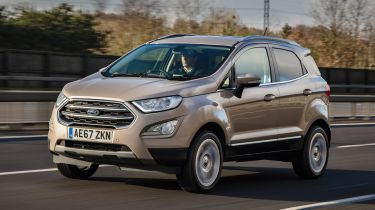Ford EcoSport (2014-2023) - MPG, CO2 and running costs
Fuel economy and emissions for the Ford EcoSport are average at best, but at least insurance costs are reasonable

Just so you know, this is an older review of the 2014-2023 Ford EcoSport. If you are interested in information about a used Ford EcoSport, or news about the latest Ford models, please follow the links provided.
The EcoSport range no longer includes a diesel-engined version, but as most buyers will drive their cars on urban roads, the entry 123bhp 1.0-litre EcoBoost petrol engine looks a reasonably strong choice. Paired with a standard six-speed manual gearbox, both the 123bhp and 138bhp versions manage a claimed 45.6mpg fuel economy under WLTP tests, with emissions of 141g/km and 142g/km respectively.
But in order to get close to the official economy figures, you have to drive the Ford EcoSport incredibly conservatively. Press on and you’ll see your fuel returns plummet, with some owners reporting figures as low as 35mpg.
Insurance groups
Even if the engines don’t quite deliver on their promise, the EcoSport shouldn’t bring steep annual insurance premiums. The 123bhp 1.0 EcoBoost Titanium and ST-Line are in group 12, while the 138bhp ST-Line sits in group 14. Splitting the two is the off-road inspired Active version in group 13.
Depreciation
Our experts predict that the Ford EcoSport will retain around 45 to 49 per cent of its new value over the course of three years and 36,000 miles of ownership. That's a reasonable performance, although the Skoda Kamiq manages an average of 54 per cent over the same three-year period.









